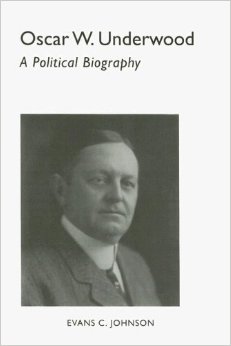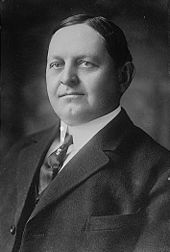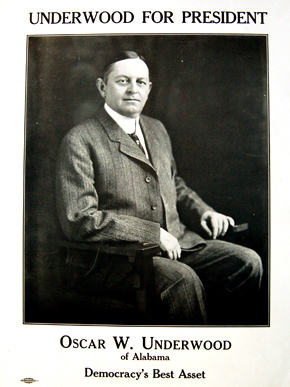Oscar Underwood (1862-1929) was contemporary and sometime rival of Woodrow Wilson, William Jennings Bryan, and Eugene Debs.
Born in Alabama during the Civil War, Underwood’s childhood was during Reconstruction when the South was occupied and pillaged to pay reparations for the war. In particular the Republican Party descended on the South to insure it would never cause trouble again by manipulating laws and voters. This baleful episode was ending when Underwood came of age, but its legacy continued (e.g., in those Confederate flags on state capitol domes).

Patrician by birth, he was a man of his time and place. He thought women should be pregnant or in the kitchen or both. Negroes were beasts of burden best kept under strict control. Southern Europeans were failed human beings. Organised labor was anathema. In his political career, to be described shortly, he was parochial, only what was good for Alabama was important.
Why read about such an obscure figure? I am glad you asked that question, Mr. Spock! (1) He was a candidate for the Democratic presidential nomination in the famous hung convention of 1924 and (2) he was one of the ‘Profiles in Courage’ (1957) television series for his confrontation with the Ku Klux Klan. The little I knew of these events made them seem odd for an Alabaman of his time and place. (3) Having just read about the egregious Alabaman George Wallace, I wondered about his fellow Alabaman. Now is the time to find out more.
Underwood ran for Congress and represented the Ninth District (Birmingham) just as the Republican ascendancy was ending. He joined with many others to purge electoral rolls of blacks and to keep them off thereafter. He developed a lock on the Democratic Party nomination as the Republican Party died in the South.

He toadied up to the Speaker of House of Representative Champ Clark who had presidential ambitions. Clark rewarded him with the chair of the House Ways and Means Committee. At the time this was a minor post, but Underwood made it into an important one with some creative thinking, hard work, and unfailingly politeness. Underwood became indispensable to the business of the House. He was ever present, always ready to do what needed to be done, even if strictly speaking someone else was supposed to do it, no job too big, no job too small. He also proved to be adroit in stroking the many egos that needed to be stroked.
His main interest in Washington was tariffs affecting his constituency, and he laboured over the tariff schedules as though they were holy writ. He had always loved facts and figures and this subject played to that strength of this born accountant. The tariff was a major national issue and he became the master of the detail of tariff schedules, the impact of item #116 on Schedule B in Part 1.21 paragraph 2.0 on his constituency, and he soon schooled others in this detail, too, as it applied to their own constituencies.
The Ways and Means Committee, then as now, manages the business of the House of Representatives, and Underwood used this as an instrument to impose party discipline. In fact, in hindsight it seems that he had more success in securing party discipline than at any other time in the history of the House. Only when there was a two-thirds majority vote from Democrats in the Party Room, would he bring a matter to the floor of the House for a vote, but then he expected 100% compliance from Democrats on the floor of the House. Dissenters soon found strange delays in office cleaning, faulty telephone lines, etc. Nothing terribly subtle about it but then there was nothing personal in it either.
In time he grew bored. Holding the Birmingham seat was foreordained; he had party discipline to a fine art. He now contracted that virus so common in Washington, Potomac Fever. He became to think of himself as a statesman, and became a little less parochial, and he began to think another Southerner might one day soon be elected president. That Southern might as well be Oscar Underwood as anyone else. He was right, it was time for a Southerner: Woodrow Wilson.
In the 1912 Democratic Convention Underwood was one of the nominees, positioned to be a compromise candidate if the front runners, Clark and Wilson failed. Wilson prevailed, and he sounded Underwood out for the Vice-Presidential nomination, but Underwood declined. I am not at all sure how serious that sounding was, because even the naif Wilson must have realised two sons of the South on the Democratic ticket would be one too many.

Wilson’s victory was a Democrat landslide and the House majority became gigantic. Underwood used all the tactics, techniques, and tricks he had learned to discipline the mob of newbies that entered the House, each determined to right all wrongs, and change everything for the better. By that time he was an old hand at managing such upstarts. They soon discovered just how unimportant a Congressman is when there is a 100-vote majority. The object lessons were quick and decisive. Outspokenly independent Democrats had no office space, no secretarial assistance, the postage franking certificate was lost…. His handshake was firm, his smile warm, his determination to lead was Birmingham steel.
While Underwood personally had no time for the amateur newcomer Wilson, he sailed with the wind in Wilson’s canvas. And besides Wilson was far preferable to Bryan, in part because Underwood must have supposed he could manipulate Wilson, though the author is silent on that possibility. Wilson’s preoccupations with the high road and his absolute belief in the separation of powers meant that he left Underwood to run the House, and run it he did.
The first item of business was the tariff, and in the new Congress no hotel vouchers were issued, no office-space was assigned and no committee posts allocated, until the tariff schedules Underwood had devised over the preceding years had been passed. He really did hold them to ransom. Pass my tariff bill (it was an omnibus bill with 57 parts to make it harder to be amended, split, or qualified with riders) or else a new Congressman may never have had an office to sit in let alone a committee seat to brag about back home. Likewise he managed the floor debate with an iron hand. Debate was permitted but not one word off the topic was tolerated, nor were any extensions of time to debate granted. A speaker who wandered off topic would be handed a note from Underwood asking him to yield.
While the small Republican minority squawked, many of them enjoyed the spectacle of new Democratic Congressmen learning the Washington game the hard way. If Underwood’s touch seems heavy, it was light compared to that applied by the previous Republican rule when debate was often not allowed.
Underwood was both a social conservative and also a fiscal conservative, yet he steered Wilson’s progressive legislation through the House of Representatives. Politics makes strange bedfellows they say.
Like many other Southerners, to Underwood the Federal government was the enemy, and he constantly voted against appropriations for any and everything, unless the money was to be spent in Birmingham. He was one of the majority who voted to cut defence spending, public health spending, education spending, funding for scientific research, staffing for foreign missions, and so on and on. The only Federal dollars he voted to spend were those bound for northern Alabama. When, however, Potomac Fever gripped him he did try to broaden his outlook, though his heart was not in it.
With Wilson in the White House, and the House proving ever harder to control, Underwood decided to move up. He secured the Democratic nomination for an Alabama Senate seat. He fought off a challenger in the Democratic primary and easily won the election. The challenge was based on what was the central issue of national politics for some years — prohibition.
After twenty years in the House of Representatives with many accolades, Underwood entered the Senate as the newest of the new boys, and found an altogether different atmosphere. The Senate was a club whose members indulged each other. There was no urgency. Underwood who had insisted on party unity and discipline in the House became himself a dissident voice in the Senate, often speaking against Democratic measures, though at the end of the day he usually voted for them, a ploy that remains common today. Speak one-way and vote the other in the effort to please both camps. Thereafter he would often then vote against the appropriation of funds for measures he had earlier voted for. Another ploy that is time-honoured.
However Underwood did not enjoy the pleasures of the iconoclast for long and soon began managing bills in the Senate and by the beginning of his second term, he was Democrat leader in the Senate. The foreign crises with Mexico and Germany did not interest him much but he went through the motions that his ambitions required. He supported Wilson in the Great War (making sure plenty of contracts went to Birmingham) and then the Treaty of Versailles but without conspicuous energy or wit.
He had been nominated for the Presidential place in the 1912 Democratic Party convention which Wilson won. Had Wilson stepped aside in 1916, and there were such rumours, he would certainly have tried for it. In 1920, well the time was not right. He was up for re-election to the Senate and Alabama state law prohibited anyone from being a candidate for two offices in the same election. He preferred to secure six more years in Washington by contesting the Senate primary and election with an eye on 1924. He campaigned for the Democratic Cox-Roosevelt (F. D.) ticket nationally though it was a lost cause from the start.
At last we come to the Ku Klux Klan. The Klan was rooted in the South and had been rejuvenated by, of all things, the prohibition movement. It was violently prohibitionist, as it was violently racist, violently anti-Catholic, xenophobic, anti-union, misogynist, anti-intellectual…..

Underwood position on prohibition was local-option. Let each community decide for itself. That satisfied neither the Wets nor the Drys. Though Underwood was flexible and pragmatic on most issues that did not effect the material well-being of his constituents, he did stick on a few, and prohibition was one of those.
Strange right there. Alabama was prohibition heartland, leaving aside home-brew, and the Klan had been founded there. (I thought about including some Klan pictures, and there are plenty to be had, but they were all so vile, I did not.)
Perhaps it was his patrician outlook or the insulation of so many years in Washington D.C. that made him insensitive to this populist cause, but he would brook no compromise on this issue, though his entire legislative career was based on knowing the time to compromise. Moreover, when he launched his bid for the Democratic nomination he went to Texas, where the official headquarters of the Klan was located, to do it, and denounced the Klan in a speech in Houston: ‘It was a secret society that took the law into its own hands.’ The battle began. There were two other leading candidates, William McAdoo and Al Smith. McAdoo was ultra-Dry and Smith, as he used to say, was all-Wet. The Klan supported McAdoo and reviled the Catholic Smith as Satan with smile.
Again Underwood’s strategy was to be the compromise candidate if McAdoo and Smith stymied each other. He did not make the Klan the sole issue but he did repeat it many times in speeches in the north-east, mid-west, and the south. The 1924 nominating convention was in New York City and the Klan timed its national conclave to coincide with it across the river in New Jersey to show its force. Underwood introduced an explicitly anti-Klan plank into the Democratic platform, which was defeated. The gloves were off. The convention was marked by fistfights in the hall, clashes of marchers for and against the Klan in the streets, arrests of delegates, a spectacle that H. L Mencken adored. Underwood’s confrontation with the Klan, won him support from the north and west but eroded his southern homeland. This convention lasted three weeks and went to 102 ballots! As the wits said, ‘We have to make a decision, or move to a cheaper hotel!’ The nominee was John Davis….
That was high-tide for Underwood who returned to the Senate, and quickly lost interest in most things. His health had never been good, and now aged sixty-seven it got worse. He retired and spent the time dictating memoirs.
Apart from the strategic reasons of gaining a national profile in his confrontation with the Klan, I cannot understand from these pages why he did it. If it was a national profile he wanted, there were plenty of other issues to pursue that would have been less risky to his southern base, e.g., the tariff, railways, immigration, taxation, and so on.
In a fine concluding chapter the author sums up Underwood as a man of moderate ability who mastered the arcane rules of the House of Representatives and then the Senate in succession and led both, the first man to do that since Henry Clay, and the last one to do it. The author gives Underwood no moral credit for his conflict with the Klan, interpreting it purely as an electoral strategy, but that just seems too simple to this reader. If anything, it effectively made it impossible for him to be the compromise candidate between McAdoo and Smith, since it assured vehement opposition from the Drys, with and without hoods. If that was the aim, it was misguided from the start, this from a man who always counted the votes twice before they were cast. To get the necessary two-thirds of votes to win, Underwood would had to have some of McAdoo’s votes, and they should have been available to him as McAdoo was also a Southerner from neighbouring Georgia. The author does do a calculation that shows if Underwood had kept his Southern base of Alabama, Mississippi, Florida, Arkansas, and South Carolina he would have had a chance.
The book is an account of his political career, much of it paraphrased from the Congressional Record. [Cue, sound of dust settling.] In some passages we get a day-by-day account of the Underwood’s committee hearings, floor speeches, and roll call votes. It was a PhD dissertation and it shows in the mind-numbing and pointless detail. None of this reveals the inner man.
I could not find a picture of the author.
I learned virtually nothing about Underwood’s childhood and how that might have shaped him for later life, like the legacy of the Civil War on this child or his boyhood experiences with blacks.
Oscar Underwood was not related to the New Jersey Underwoods who made typewriters. Nor is he related to Frank Underwood. [Get it?]
Skip to content
